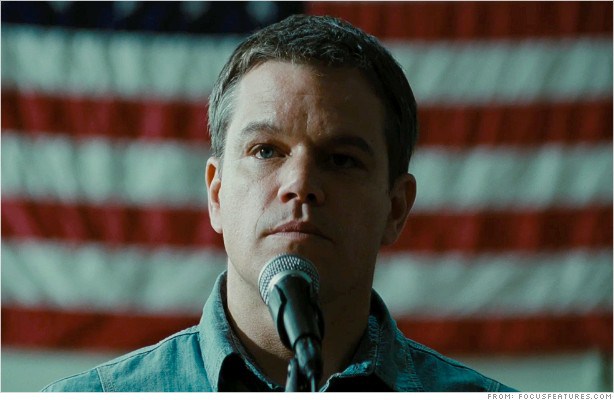Directed by Gus Van Sant
Written by John Krasinski and Matt Damon
USA, 2012
When people suffer through desperate times, someone is always ready to capitalize on their fear and confusion. This person, a con artist even if they have a fancy-sounding job title, has the offer of a lifetime, the promise of something far too good to be true. In Promised Land, the solid social-issue drama from director Gus Van Sant, this age-old conflict is spun out as a referendum on big companies attacking the little guy, and on cynicism and where each person’s limit for this inherent negativity is.
Matt Damon (who co-wrote the film with his co-star and co-producer, John Krasinski) stars as Steve Butler, who works on the ground for Global Crosspower Solutions, a conglomerate interested in buying up the land in a small town in the heartland of America to get at the natural gas underneath its many farms via the controversial method of fracking. Steve and his cohort Sue (Frances McDormand) go door-to-door, trying to shore up support, but soon find a surprising amount of opposition in the form of an elderly schoolteacher (Hal Holbrook) and a young environmental activist (Krasinski). As the situation escalates, Steve starts to question his professional purpose and reflects on his Iowa roots.
What works so well about Promised Land is its assured tone mixed with a heavy (sometimes too heavy) blend of old-fashioned cornpone sentimentalism. Steve is frequently ready to tell people “I’m not a bad guy” as soon as the company he works for is demonized, and he’s not, though he’s more complex than he wants to let on. Damon is a perfect fit for the role, as his gee-whiz boyish nature still shines through every once in a while as he straight-up lies in the faces of scared, worried farmers or homeowners (played by, among others, Tim Guinee and Lucas Black). Perhaps the only baffling aspect to Steve’s character is that he’s, weirdly, very quick to take offense and get ruffled. An early standout scene has Steve being put on the defensive by Frank, the elderly teacher, at a town hall meeting. Because Damon and Holbrook are consummate pros, the sequence works well. Still, Steve is so shocked that anyone would dare oppose his company’s methods; shouldn’t a guy who’s touted early on as one of the best in the business have a contingency plan when the people he’s trying to buy don’t fall in line immediately?
Aside from this minor quibble, the only real issue in Promised Land is that eventually, the various speeches and debates between Steve and Sue, or Steve and Dustin, the activist, or Steve and Frank get to be a bit much, overly on-the-nose, with the final sequence being too much to bear. Having said that, Promised Land stumbles infrequently, getting a lot of things right, including the feel of this small Midwestern town. Van Sant leaves any unnecessary stylistic flourishes at the door, instead lulling the audience with nearly hypnotic imagery, drowning us in old-school Americana. Barns with paint flaking off, Little League baseball games, grass stretching as far as the eye can see; this movie is like a modern-day take on a Norman Rockwell painting. All it’s missing is a scene at night with characters cuddling up to a fire. Cinematographer Linus Sandgren does exemplary work in capturing this world, especially in the many overhead shots where we watch Sue and Steve driving around the town, on its many winding roads.
As Sue and Steve interact with the town, we’re treated to a bevy of character actors in minor but intriguing parts. From Guinee and Black to Titus Welliver as a friendly storekeeper to Rosemarie DeWitt as an attractive young teacher to Scoot McNairy (who must be contractually obligated to appear in films produced by members of the new Ocean’s Eleven, like this and Killing Them Softly), the supporting cast in Promised Land is stacked. If anything, we get too little of these talented performers. Though Damon’s the strongest in the bunch, Krasinski is quite good, getting to skew his innately goofy charisma by playing a character whose agenda always seems more selfish than it should.
Promised Land brings up a serious topic in our modern culture, asking us to consider the benefits and drawbacks of fracking our natural landscape. That it devolves into preachiness isn’t surprising; rarely can a drama tackling current events in this Capra-esque way, a movie that clearly has a point it wants to shout from the rooftops, be subtle in its arguments. However, thanks to an able and impressive cast led by Matt Damon, in one of his best if unshowy performances, and a confident hand behind the camera, Promised Land is a low-key but successful story about a man unsure of what price he’d be willing to pay to lose his soul for the almighty dollar.
— Josh Spiegel




